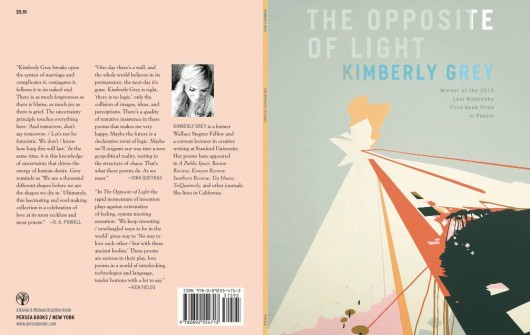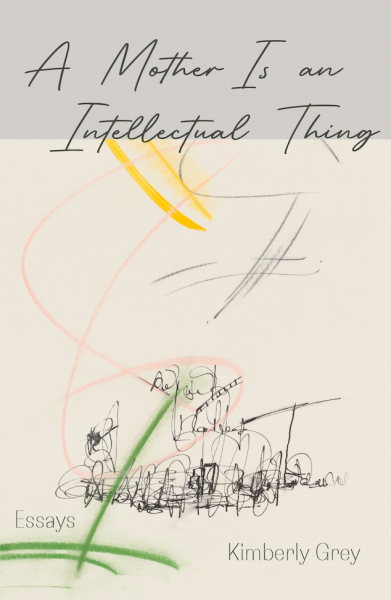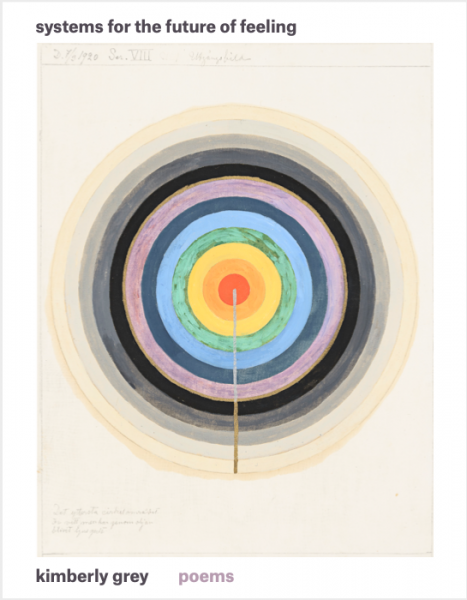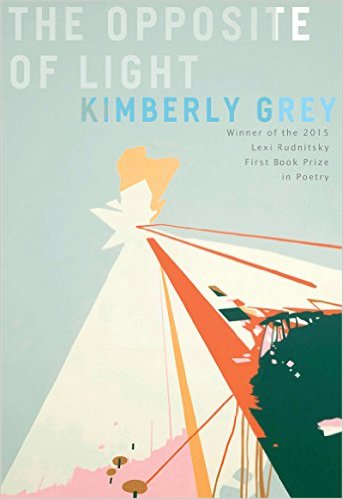
Order the Book:
Barnes and Noble
Amazon
LIBRARY JOURNAL Reviewed by Barbara Hoffert
In this dazzling book, winner of the 2015 Lexi Rudnitsky First Book Prize in Poetry, Grey does something brave. She investigates contemporary marriage without sounding ironic, treacly, or angry. It’s a process (“If I am building you, I have/ forgiven you” says the opener, and the penultimate poem is titled “Rules of Becoming”). There’s ambivalence and divergence (“I wanted a lovemonger./ You were a warmonger”), and disillusionment is inevitably folded in (“Always the sound of/ a sad wonder trumpet”). But if Grey sees “No way to love/ each other but with these ancient bodies,” she is also intent on looking at love differently in a different age; “nothing as old-fashioned as making/ a lover with a rib,” she proclaims, comparing herself and the beloved to “toy cars, electric and modern.” VERDICT Writing about love could be worn, but this is fresh and enticing; for all readers, even if the language sometimes challenges.
PUBLISHERS WEEKLY
Grey raises a wall of sound while meditating on love, power, and control in her debut collection, winner of the 2015 Lexi Rudnitsky First Book Prize in Poetry: “Built your truss, built your small back,/ all I could muster, all cheek and luck.” Grey lures readers into a world full of clever language and heartfelt metaphor. “Love is not an actual helmet. It is/ fashionable. We wear it to feel heavy/ with gold,” she writes. As Grey posits lively dichotomies, those ups and downs bleed through the text to enact the movement of relationships through time. In the aptly named “Fragments of Time,” reality sets in; “I want to tell you how it splits/ me how I am so sad for/ what strays you fix your hair you leave.” Memories of experience, unfocused and non-linear, make brief, star-like appearances. “What we’ll always have becomes something we lost,/ becomes something we want, becomes sadness,” Grey writes. In the face of the inevitable death—and subsequent mourning—that comes with love, she presents readers with words that are immediate and alive. Excavating her own shared, mundane experiences, Grey finds both deep truths within those fleeting joys and a fresh way to present a very old idea
BOOKLIST Reviewed by Janet St. John
In her debut collection, Grey, a recent Wallace Stegner fellow, uses mental and linguistic acrobatics to explore what modern love and marriage really looks like. Her poems involve a search for symmetry, as the first and second halves of the book mirror and complete each other like lovers by revisiting paired topics and themes of invention and reinvention, memory’s deconstruction and reconstruction, and relationships’ beginnings and endings. The poems further this mirroring dance within their lines, as in “What we’ll always have becomes something we lost,” and through such titles as “The Functions of X and Y” and “The Function of You and I.” It’s apt that light and its opposite represent the collection overall, since the poems often bounce in tone and feeling between brightness and shadow. There’s no doubt Grey took exceptional care in writing, revising, and compiling these poems. They chime and resonate like deftly struck, fine crystal.
Reviewed by SCOUT
In Kimberly Grey’s debut, winner of the 2015 Lexi Rudnitsky Prize, the opposite of light is not darkness but “light’s potential”—dark because unknown, perhaps, but with the possibility “to change us into that thing we never were / before.” Grey’s subject is marriage, or the conjugation of a you and an I, and her poems traverse the emotional terrain of coupling while grammatically conjugating what togetherness looks and feels like—“We love, you / have loved I will love/ you”—in the twenty-first century.
Grey’s poems function as finely tuned objects, with rhetoric providing the engines. She favors anaphora (“Built your truss, built your small back, / all I could muster, all cheek and luck./ Built your hum to crescendo…”) and the subjunctive voice (“If we weren’t starving for one thing, / we’d starve for another”), using both to spin out gestures or imaginative stances as far as they will go, harnessing syntax and juxtaposition to enact the process—sometimes smooth, sometimes fraught—of the I and you becoming we. One of her recurring questions is how love survives our contemporary context, where daily “the newspaper says / the world is in no way merciful” and “[t]here are too many / machines to teach / us sadness.” In “Modern Sentences,” Grey uses terms that millienials will understand:
…Let’s be vegan.
Let’s drive a Prius. Let’s find a robot
to make our bed and bring us tea.
My dear, I promise I’ll homeschool
you if you homeschool me. I am
a 21st-century wife. Tonight I’ll touch
you in some otherworldly way
and we’ll copyright it, YouTube it…
But in opposition to the technological idiosyncrasies modern love withstands, the poem ends with a low-fi declaration: “No way to love / each other but with these ancient bodies.” The Opposite of Light does not make light of the business of joining one’s life to another, and Grey thrives in the space of possibility, where what comes next, although not mapped, is welcome. The book’s final lines from the tour-de-force poem “The First Marriage” bear out this paradox: “We were fine / inside that egg, one yolk to get us through. Then with a squawk and a flap, she said I-love-you- / god-speed and cracked us in two.”
Review by Ron Slate
We are archaic — in our sources, impulses, outreaches and aloneness. They say dogs have stereo olfaction — they can smell two things at once through independent nostrils. Some poets have dual sensors, too – one for the triggering situation, one for the archaic presence within it. By necessity, the initial brief notices of Kimberly Grey’s first book of poems, The Opposite of Light, name marriage as the work’s situation. But a long compulsion to keep returning to and leaping from its marital materials comprises its own situation. The sensing of both the archaic and the anarchic is the occasion.
Grey’s poems are perpetual clarifications that resist too much clarification. There can be no probing without uncertainty, without exposing the unrefined to the air. Two gestural figures share an interior space but suggest discrete vectors. As the relationship or marriage loses momentum, the separated person is less loved and perhaps wonders about her lovability. It’s provocative to me, then, that the strangely seductive intimacy of Grey’s work intensifies my desire to pass into the world she enacts through her own language. Separation and space intensify what may be shared. Somehow, we readers are part of the lovers’ grief. The domestic situation goes global.
SOMEHOW, WE ARE A WE
So many beautiful, manageable heads. If only we were
allowed a hundred different joys. What a radical idea.
No
goodness will get you far. Your loveliness is measured
by the number of poor things you’ve dazzled. Add in
an old city ruin, and some translated light, which
is
foreign and sounds cool, but cannot be understood.
Goodness is contrived. No one wants it. It’s before
breakfast and already our hearts have gone bad.
Yesterday I watched two birds fight over the same
blue square of sky. The philosophers say if you take
something you don’t love in your arms and unhurt it,
you will be happy. But we are not happy. Everything
electrical is not light. All over there are crowds
of people waiting to be caressed. Every bed in the world
was manufactured for just a few. We are magnolia
white, spoon light, leftover flight. We are spiny
and unforgivable. It is good to ache and be wise for it.
You come back in the door that I’ve walked out of.
It’s ceremonial. It’s revolving. The back of your beautiful
head. Your hands are here; I can’t tell where, but it is
the best kind of uncertainty. Happiness is when every
thing
inside you goes out and comes back in, newly.
There is an indifference of heart here that seizes like happiness. Detachment is not just a mood but a condition with dimension. What is this “goodness” that must be renounced? She is avowing complicity with what dismays and bewilders her. An affirmation in no need of serenity. The conventional alternative requires the sort of orderliness that sanctions marriage in the first place – but something archaic in her bristles at the interpreted world. There is also the archaic will to survive — there may not be recrimination and resentment for the Other, but the poems represent a sort of victory. What else is real living but a return to oneself – “when every / thing inside you goes out and comes back in, newly”? The generosity of The Opposite of Light is the revolving door “I’ve walked out of” – since we follow her through it and come back in.
In a Kenyon Review interview, Grey points to Alice Fulton as an influence and quotes the latter’s preference for “an expatriate space … a linguistic state that is both foreign and available to readers … a slightly skewed domain where things are freshly felt because they are freshly valid.” Fulton coined the term “fractal poetics” to describe a disinterest in (no, revulsion of) reproducing speech and a suspicion of self-credit-reflection and sincerity. When Grey says “Goodness is contrived,” she is heckling the poem that must be rejected for the one created out of crudeness (even in its unwritten state, the spurned poem is an adversary).
“Marriage / is a wilderness we must all come out / of,” she writes in “Heroic Sentences,” but having come out she won’t turn away or take up other topics. Yet Grey avoids the dreadful inertia of “project” books. She excels sonically in the manner of predecessors like Heather McHugh and Lisa Russ Spaar. Just when a string of declarative phrases begins to predict themselves, she reshuffles the deck. She offers various shapes on the page. In “We Are Mostly Merciful, “she writes, “The minor part of me thinks obsession is what kills / thinking. The major part thinks obsession makes the world / go round.” Exactly. This rather self-knowing statement (I appreciate her risk of it) spells out the book’s embedded tension – the necessary reticence of poetry grating against the necessary outburst of poetry. To watch and hear a young poet managing this rare feat is marvelous entertainment and dizzying pleasure.
In “We Are Mostly Alright” she writes, “We have never loved / the world only the words / we used to describe it.” This alleged indictment of words doesn’t quite fit — though in Grey’s world, one must make allowances for contradiction. Some of the self-sniping and mordant slaps at the relationship, like “We furnish / our losses with an armchair and stove,” come too easily at times — but Grey generally manages to sustain the active, propulsive, digressive character of the central poems. Her emphasis from the start is on invention — and we set an expectation early on for inventive phrasing, even as she deflates her own ambition, or seems to for the moment: “We keep inventing / newfangled ways to be in the world” and “Tonight I’ll touch / you in some otherworldly way / and we’ll copyright it, YouTube it, / tell the general public this is our way / of being modern” (from “Modern Sentences”).
Desire for the Other doesn’t dissipate in these poems of a marriage’s deconstruction — a “you” is invented in the opening poem and addressed repeatedly. “Meditation in B” concludes, “We are close to bed now. / One late night snack. I’m butter // you’re bread. We can be prison food, happily. And if / hungry is beautiful in any of these ways, I want to / eat I want to eat I want to eat it.” As loss dominates throughout, Grey maintains an agility that prevents the blandishments of mere tone from diluting the forceful, original impulses of expression — as in these lines ending “Wound! Out from Behind Two Crouching Masses of the World the Word Leapt”:
… The distance between two alike things. The distance between two unlike things.
The decision I must make now. Whether or not we are fastened together like moth wings or clam shells. Whether
we hurt. And what is symmetry anyway but two things wanting, in all their possible differences, to be exactly
the same? I tell you Tuesdays are long because they are long in this deciding. And red, so you’d have something
to look at while I think this through: how to know if we are these two, tightly wound things, or just a wound plus a wound?
When I recall myself reading and rereading The Opposite of Light, I think back to that line in “Somehow, We Are A We”: “Your loveliness is measured
/ by the number of poor things you’ve dazzled.” I’m one of those poor things, dazzled.






